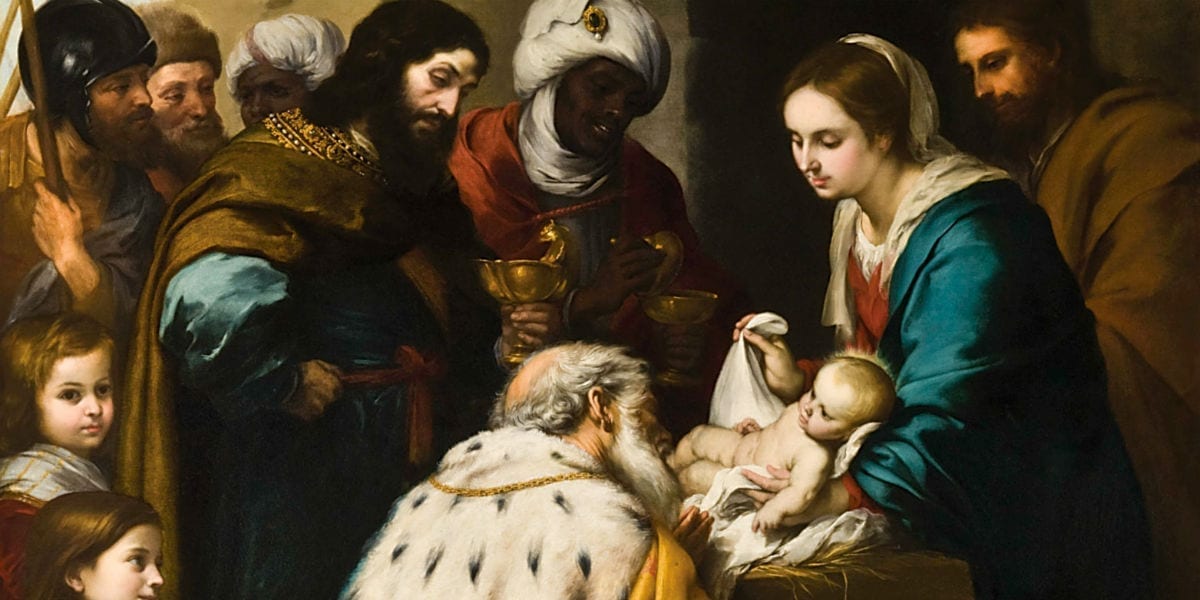Pope Leo XIV – Inaugural Mass Homily
Elected on May 8, 2025, as the 267th successor of St. Peter, Pope Leo XIV’...

Here Peter Chrysologus brings together the three events traditionally remembered on the Solemnity of the Epiphany: the visit of the Magi or Wise men, Christ’s baptism in the Jordan River, and Jesus’ first miracle performed at the Wedding Feast of Cana. All three events are visible manifestations that Jesus is the divine king – his humanity is a sacrament of love which both reveals and veils his divinity.
In the mystery of our Lord’s incarnation there were clear indications of his eternal Godhead. Yet the great events we celebrate today disclose and reveal in different ways the fact that God himself took a human body. Mortal man, enshrouded always in darkness, must not be left in ignorance, and so be deprived of what he can understand and retain only by grace.
In choosing to be born for us, God chose to be known by us. He therefore reveals himself in this way, in order that this great sacrament of his love may not be an occasion for us of great misunderstanding.
Today the Magi find, crying in a manger, the one they have followed as he shone in the sky. Today the Magi see clearly, in swaddling clothes, the one they have long awaited as he lay hidden among the stars [Mat. 2:1-12].
Today the Magi gaze in deep wonder at what they see: heaven on earth, earth in heaven, man in God, God in man, one whom the whole universe cannot contain now enclosed in a tiny body. As they look, they believe and do not question, as their symbolic gifts bear witness: incense for God, gold for a king, myrrh for one who is to die.
So the Gentiles, who were the last, become the first: the faith of the Magi is the first fruits of the belief of the Gentiles.
Today Christ enters the Jordan to wash away the sin of the world. John himself testifies that this is why he has come: Behold the Lamb of God, behold him who takes away the sins of the world. Today a servant lays his hand on the Lord, a man lays his hand on God, John lays his hand on Christ, not to forgive but to receive forgiveness.
Today, as the psalmist prophesied: The voice of the Lord is heard above the waters [Ps. 29:3]. What does the voice say? This is my beloved son, in whom I am well pleased [Mat. 3:17].
Today the Holy Spirit hovers over the waters in the likeness of a dove. A dove announced to Noah that the flood had disappeared from the earth; so now a dove is to reveal that the world’s shipwreck is at an end for ever. The sign is no longer an olive-shoot of the old stock: instead, the Spirit pours out on Christ’s head the full richness of a new anointing by the Father, to fulfill what the psalmist had prophesied: Therefore God, your God, has anointed you with the oil of gladness above your fellows.
Today Christ works the first of his signs from heaven by turning water into wine. But water has still to be changed into the sacrament of his blood, so that Christ may offer spiritual drink from the chalice of his body, to fulfill the psalmist’s prophecy: How excellent is my chalice, warming my spirit.
For more great resources on the Epiphany, the Magi and Cana, visit the Epiphany – Baptism of Christ section of the Crossroads Initiative Library.
This post on how Epiphany connects the visit of the Magi with the Baptism of Jesus in the Jordan and the Wedding Feast of Cana is excerpt from a sermon by Saint Peter Chrysologus (Sermo 160: PL 52, 620-622). It appears in the Roman Catholic Office of Readings for the Monday between the Feasts of the Epiphany and the Baptism of the Lord. The accompanying biblical reading is Isaiah 61:1-11.
Banner/featured image Adoration of the Magi by Bartolomé Esteban Murillo. Public domain.
Eamonn Monson
Posted at 05:31h, 07 JanuaryHow excellent is my chalice, warming my spirit.
What Psalm is this quote from,.please
Dr. Marcellino D'Ambrosio
Posted at 16:14h, 13 JanuarySt. Peter Chrysologus is likely quoting from memory a line from the Latin translation of the Bible to which he is accustomed, and what we have on this page is an English translation of that. There were no chapters and verses in the Bible in his day, and he gives us no hint as to where this quote comes from except that it is from a psalm. I do not have access to the Latin text and so can’t do a word search on the most common Latin translation, St. Jerome’s vulgate. My best guess is that it is a loose allusion to Ps. 23:5 “my cup overflows.”